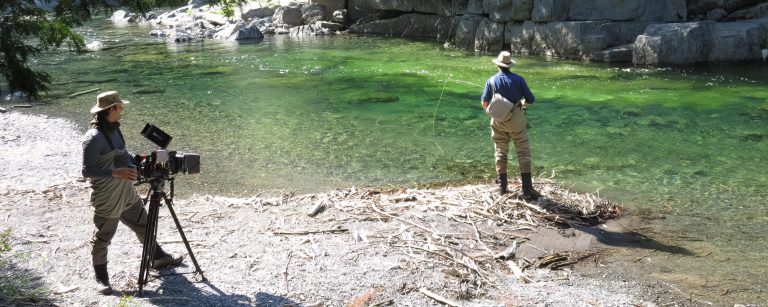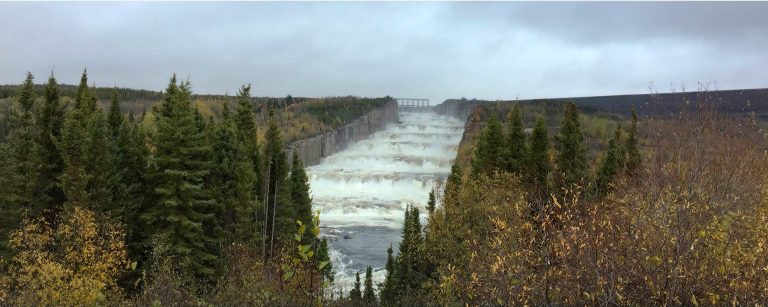In the process of overseeing off-studio cinema, the field producer plays an essential role in transforming the director’s vision into reality on location. He navigates the unpredictability of shooting environments with a blend of ingenuity, logistical acumen and rapid problem-solving. His role is to distill the essence of a script into workable shots, ensuring that the authenticity of the story is perfectly transcribed against the backdrop of real-world settings.
On the front line, field producers meticulously seek out and secure shooting locations, manage permits and align production needs with local capacities. Their strategic oversight extends to budgeting, scheduling and maintaining crew well-being, often under difficult circumstances.
In Canada’s diverse regions, the role of the field producer is amplified. His in-depth knowledge of local regulations, weather conditions and community dynamics is essential for filming across the country. His work makes Canada an attractive and versatile canvas for filmmakers from all over the world.
The core of a field producer’s job is to bridge the gap between artistic intent and practical execution, ensuring that the authenticity of the world on screen is as captivating as reality itself. It’s their commitment to cinematic veracity that captivates viewers, inviting them into the heart of the narrative.
The Field Producer Defined
The role of the Field Producer is both distinct and critical in the filmmaking process, setting them apart from other production roles. Unlike line producers, who primarily manage the budget, or executive producers, who oversee the entire project from a business standpoint, Field Producers are the tactical leaders on the ground. They are entrusted with the immediate task of transforming a screenplay into a logistical blueprint for successful shooting, particularly in the unpredictable throes of on-location filming.
Responsibilities Distinct from Other Production Roles:
- Scouting and Securing Locations: Field Producers are instrumental in finding and securing the perfect filming spots that align with the director’s vision while also considering practical logistics and legal constraints.
- Permit Acquisition: They navigate the complex web of local laws to acquire the necessary permits, ensuring the production adheres to regional filming regulations.
- Technical Planning: With a deep understanding of the technical needs of a shoot, Field Producers plan the details of lighting, sound, and camera work, coordinating with the technical departments to address challenges specific to the location.
- Crew Coordination: They are responsible for the well-being of the cast and crew, ensuring that schedules are met and that the team has the necessary support to work effectively.
- Crisis Management: When unexpected issues arise, Field Producers are the ones who must quickly devise and implement solutions to keep the production on track.
Skills and Attributes of an Effective Field Producer:
- Adaptability: They must be flexible, able to adjust plans swiftly in response to the ever-changing dynamics of location shoots.
- Problem-Solving: Effective Field Producers are critical thinkers who can anticipate challenges and creatively overcome obstacles.
- Communication: Clear and effective communication is essential, not only for coordinating with the crew but also for negotiating with local authorities and community members.
- Leadership: Strong leadership skills empower Field Producers to manage teams, inspire confidence, and maintain morale, even under stress.
- Cultural Sensitivity: Working in diverse settings requires a respect for and understanding of local customs and norms, which is crucial for smooth operations and mutual respect on set.
In essence, the Field Producer is the nexus of creative and practical filmmaking, a role that requires a rare combination of vision, tenacity, and versatility. They do not just facilitate; they are instrumental in bringing the cinematic story to life, infusing each scene with the authenticity and dynamism that only real-world settings can provide. Their unique skill set is what allows a film to transcend the limits of imagination and become a tangible and relatable work of art.
Pre-Production – The Planning Phase
Before the cameras roll and the action unfolds, the foundations of any film project are laid during pre-production, a phase in which the field producer’s role is both vast and meticulous.
Scouting Locations and Securing Permits: The field producer begins with the strategic task of scouting locations, a process that is not limited to aesthetic considerations. He or she must evaluate each potential site in terms of its logistical feasibility, availability and suitability for the film’s narrative needs. Once a site has been pre-selected, the location producer begins the complex process of obtaining authorizations. This requires a thorough knowledge of local laws and regulations, as well as liaison with the various authorities, from local councils to environmental agencies, to ensure that the film’s production doesn’t hit any legal hurdles along the way.
Coordinating Pre-Shoot Logistics: Once the site has been scouted and permits obtained, the field producer’s attention turns to coordinating the logistics. This encompasses a wide range of essential tasks:
Equipment Coordination: He checks the technical requirements of the shoot and ensures that the right equipment is available and working. This may involve organizing the rental and transport of cameras, lighting and sound equipment adapted to the requirements of the location environment.
Crew Assembly: The field producer plays a crucial role in building the out-of-studio team, selecting the technicians and creative staff whose skills and experience are best suited to the challenges posed by the particular shooting environment.
Travel Arrangements: They meticulously plan travel itineraries, from the point of departure to the shooting location and back. This includes arranging accommodation, transporting personnel and drawing up a detailed schedule, synchronized with the shooting schedule.
Budget Management: Throughout all these planning stages, the field producer keeps a close eye on the budget. He or she is responsible for ensuring that pre-production arrangements are financially efficient without compromising the creative integrity or logistical needs of the production.
In this pre-production phase, the field producer is the project architect for the film’s foundations. His foresight and planning enable the subsequent phases of production to unfold with precision and artistic fluidity. He is the invisible hand that guides the project from concept to the edge of reality, paving the way for the creative magic of the shoot itself.
In the Thick of It
When production is underway, the field producer is at the heart of the action. Every day is a unique confluence of planning and improvisation, requiring vigilance as constant as it is intense.
A Day in the Life During a Shoot: A typical day for a field producer begins before crew call time. He is the first to arrive and ensures that the day’s shooting location is ready for action. They check with local contacts, confirm that permits are in order, and verify that equipment has arrived and is set up correctly. Throughout the day, they are a dynamic force on set, always ready to adapt to the demands of the day. They can negotiate last-minute changes with the owners, rearrange the shooting schedule due to unforeseen weather conditions, or solve technical problems with equipment on location.
The decisions made on the fly by the field producer are characterized by a blend of creative ingenuity and logistical precision. He is the one who must quickly find alternative solutions when a chosen location suddenly becomes unavailable, or a key accessory goes missing. It’s a high-wire act, balancing the day’s planned activities with the need to pivot at a moment’s notice, all within the shooting schedule and budget.
Collaboration with the Director and Director of Photography: The Field Producer works closely with the Director and Director of Photography (DP) to ensure that the creative vision is not only preserved, but enhanced in the field. He is the director’s ally, interpreting his artistic needs in practical terms for the crew. Working with the cinematographer, the field producer facilitates the technical aspects of capturing the desired shots, understanding the importance of light, framing and movement within the physical constraints of the environment.
This collaboration is a delicate dance of communication and respect for each other’s expertise. The field producer must be attentive to the director’s creative process, allowing artistic freedom of exploration while keeping an eye on the logistical clock. Together with the cinematographer, he or she must ensure that the technical team is ready to achieve the day’s visual objectives, often overseeing complex sequences that require precise timing and coordination.
At the heart of production, the field producer is the point of contact between creative aspirations and the realities of shooting on location. They solve problems, make things easier and, often, are the unsung heroes who ensure that, despite the challenges of the day, the story is brought to the screen with integrity and impact. It’s their unshakeable presence and decisive action that allow the film to rise above storyboards and become a living cinematic work of art.
Wrapping Up
As the film shoot winds down, the role of the Field Producer evolves yet again, this time extending into the realm of post-production. While their presence on the set is often associated with the hustle and bustle of production, their responsibilities continue to ripple through the quieter halls of the editing room.
Ensuring Complete and Organized Footage: The Field Producer’s foresight during the production phase is critical in averting post-production pitfalls. They work closely with the director and the director of photography to ensure that all necessary shots are captured, paying particular attention to the editor’s checklist. This includes securing coverage shots, cutaways, and B-roll that provide the editing team with options and flexibility during the assembly of the final product.
It is not enough to simply have all the footage; it must be meticulously organized. The Field Producer supervises the labeling and logging of footage, ensuring that each clip is accounted for and easily accessible. This can involve overseeing the digital data management on set, including the backup processes that safeguard against data loss.
Contributions to Post-Production: Even after the set has been removed and the location cleaned up, the field producer can continue to play an active part in post-production. They are often consulted during the editing process, to give their opinion on the intentions behind certain shots, or to clarify details about the circumstances in which sequences were captured. Their input can be invaluable in re-enacting the story, particularly when it comes to choosing between different shots, or matching studio footage with footage shot on location.
In some cases, the field producer may coordinate reshoots to capture additional footage that the editors or director deem necessary. He can also act as liaison between the production and post-production teams, ensuring clear communication and continuity of vision.
The wrap-up phase underlines the total involvement of the field producer in the film-making process. From pre-production planning to the final touches of post-production, their contribution testifies to the essential role they play in crafting a film that resonates with audiences long after the credits roll. Their commitment to the project’s success is evident not only in the field, but also in the attention to detail that enables the film’s narrative to be seamlessly woven together in post-production.
Challenges Unique to Field Production
The pursuit of authenticity in filmmaking through location shooting presents a range of challenges, many of which fall to the field producer to address. These challenges are as varied as the locations themselves, and require ingenuity and resilience on the part of the field producer.
- Weather problems: One of the field producer’s most formidable adversaries is the weather, which can change from ally to antagonist in an instant. A clear sky can turn dark with storm clouds, turning a carefully planned day into a test of adaptability. Producers in the field need not only to have contingency plans in place, but also to be able to make decisions at lightning speed, either to protect equipment and crew, or to seize an unexpected opportunity that new weather conditions might present.
- Local regulations and community relations: Each film location comes with its own set of regulations and community expectations. Navigating these can be a complex task, particularly when filming in areas subject to strict guidelines, or in close-knit communities fearful of disruption. Field producers must build relationships with local authorities and residents, often becoming diplomats who negotiate conditions that satisfy both production needs and community concerns.
- Unexpected events: The unpredictability of the real world means that unexpected events are inevitable. Whether it’s local festivities clogging up a chosen location, or the sudden unavailability of key local talent, the field producer must be highly responsive. He solves problems, quickly reshuffles programs and even stages to accommodate these changes, while ensuring that the integrity of the production is preserved.
- Problem-solving under pressure: in the face of these challenges, the field grower’s ability to solve problems becomes paramount. He maintains open lines of communication with all departments, enabling information to be disseminated quickly and problems to be solved collaboratively. He must also manage the stress these problems can cause to players and the team, keeping morale high and production on track.
Producers in the field often use a mix of preventive strategies and reactive measures. They carry out thorough risk assessments for each location, to identify potential problems before they arise. They maintain an arsenal of contingency plans, but also cultivate a climate of flexibility and creativity that encourages the team to find innovative solutions.
The role of the field producer in solving these problems is essential to the success of the production. His expertise and composure in the face of adversity not only keeps the production moving forward, but also ensures that the story being told is not compromised by the unpredictability inherent in filming on location.
In the world of filmmaking, Field Producers are the pivotal force that transforms a vision into a visual narrative, making the impossible possible beyond the studio's gates.
In Conclusion, The cinematic landscape is vast and varied, stretching far beyond the studio’s soundproof walls to the wild, unpredictable world outside. In this expanse, the Field Producer stands as a pivotal figure, an orchestrator of the myriad elements that bring a film’s vision to life. They are the catalysts that enable stories to unfold against the rich tapestry of real-world settings, ensuring that each frame captures the authenticity and essence of the narrative.
The adaptability and resilience of a Field Producer cannot be overstated. These professionals are masters of contingency, capable of navigating the complexities of weather, local regulations, and the unexpected with grace and efficiency. They are the steady hand in the storm of production, the calm voice that guides the crew through challenges, and the strategic mind that ensures the final product reflects the initial vision.
For those aspiring to step into the role of a Field Producer, or for cinephiles seeking to understand the intricacies of film production, it’s essential to recognize the immense behind-the-scenes efforts that make the magic of movies a reality. It is a career that demands not just a passion for film but a dedication to the craft that is as relentless as it is rewarding.
As we consider the art of filmmaking, let’s pay tribute to the unsung heroes of field production. Without their skills, determination and unwavering commitment, the stories that resonate with us, transporting us to different places and times, simply wouldn’t be possible. The role of the field producer is integral to the alchemy of storytelling, and their contribution deserves to be recognized and admired in the pantheon of cinematic achievement.














